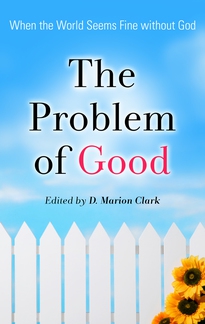This week’s interview is with P&R editor, D. Marion Clark. Marion is the editor of The Problem of Good: When the World Seems Fine without God.
- Question #1 – Which writers inspire you?
C.S. Lewis, John Donne, George Herbert, J.R.R. Tolkien. I cannot emulate them. I find their writings sublime and cannot but be inspired in my spirit.
- Question #2 – What inspired you to write this book, about this topic?
The problem of good is the issue that has most challenged my faith. How can so much good and beauty come forth from the actions and writings of not only unregenerate persons but from immoral persons? How do I account for the beauty and truth that springs from the pens of atheists, agnostics, and outright immoral authors? And then there is the matter of discerning what we as Christians may learn from unregenerate writers and even enjoy in their writings and arts and professional skills.
I knew that the answer lay in the doctrine of common grace, but I could find little extensive work on the subject, and even less written for the lay reader. Thus The Problem of Good is my attempt to fill in to a measure that gap with the hope that others will explore the doctrine further. As I study the doctrine more, I am convinced that a deeper understanding the doctrine clears up the fundamental problem of how the unregenerate can produce works that possess beauty, truth, and practical good, as well as give Christians guidance on how to be in the world while being not of it.
I am only one of the writers in the book. The rest were chosen for their expertise in their fields, and so they are able to give insight into various questions – what does the doctrine entail? How does the doctrine affect witnessing, learning from our neighbor, loving our neighbor, and enjoying what our neighbor has to offer?
- Question #3 – Other than the Bible, do you have a favorite book?
No one book, but any by the authors listed above. And for some reason I am drawn to the Arthurian legend. T. H. White’s The Once and Future King is filled with spiritual insight, a testimony to the work of common grace.
- Question #4 – Do you have a favorite author? Who is it and why?
C.S. Lewis is easily the author I turn to the most. My interest in him began in college when I was allowed to design a self-study course on him. Whatever his genre, he has the ability to craft sentences that engage the reader. I learned from him that one may know a subject well, but there is a gift to putting words together. I can pull down any of his books and essays, open randomly to a page, and become immediately engaged.
- Question #5 – Do you have a favorite quote? What is it and why?
“It’s a dangerous business, Frodo, going out your door. You step onto the road, and if you don’t keep your feet, there’s no knowing where you might be swept off to.” The Fellowship of the Ring
More than once I have not kept my feet and was swept off to places and experiences never intended but always enlightening.
- Question #6 – Is there anything you would like to add that you have not been asked about?
The Problem of Good is especially helpful to the young person entering a secular college where he or she will tackle this problem head on. Young people leave the faith not because they were confronted with the problem of evil, but because they met intelligent, winsome professors and students. This causes them to question how necessary it is to profess the Christian faith. This book will help them make sense of what they experience, as well as help them to gain greater appreciation for the ways of our great God.
How can readers discover more about you and your work?
- Website: www.dmcresources.com
- Facebook Page: https://www.facebook.com/dmarionclark


Comments